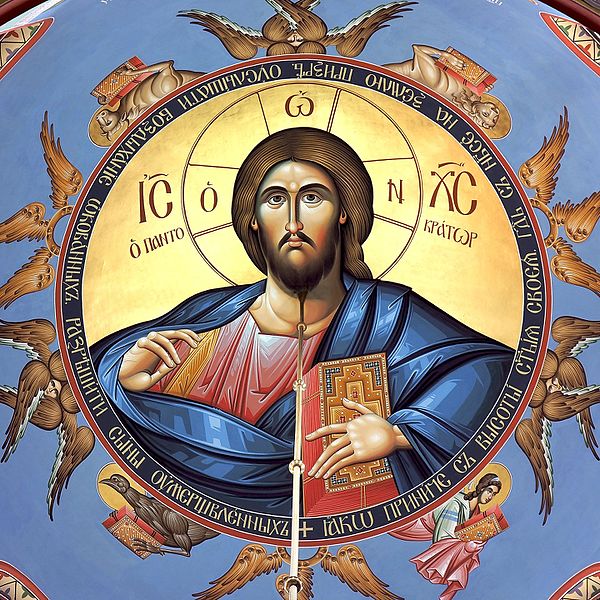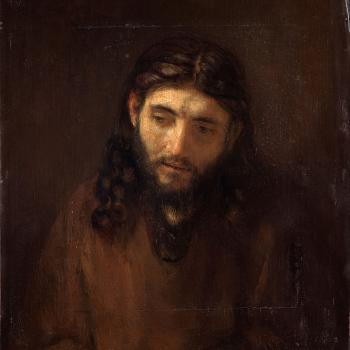
Libby Anne was raised (like so many atheists I have encountered) as a fundamentalist Protestant and later became an atheist. Her blog on Patheos is called Love, Joy, Feminism. Today I am responding to her piece, “Jesus, the Trinity, and Subterfuge” (7-29-19). I want to focus on her specific claim as to whether Jesus claimed to be God or not. Her words will be in blue.
*****
I spent my evangelical childhood and adolescence studying apologetics; as a young adult, . . .
I don’t know how she missed all the biblical passages I shall bring to bear, then . . . As I mentioned in a recent reply to another atheist:
It’s one thing to simply state, “I don’t believe or accept what the Bible / Christianity teaches.” We understand that this is (broadly speaking) the position of the atheist.
It’s quite another, on the other hand, to state, “The Bible teaches particulars x, y, and z” . . . which opens one up to the possibility of being shown that the claims made are demonstrably false statements as to fact.
Thus, in the present instance, Libby is making assertions about what Jesus did or did not claim. Thus, it is a discussion of biblical interpretation (hermeneutics) and exegesis). And that is my area. I’ve been doing apologetics for 38 years, with special emphasis on the Bible, both as an evangelical and as a Catholic.
Early Christians argued over who Jesus was precisely because he never directly claimed to be God. He was vague.
This is absolutely false, and I will thoroughly refute it below (as the bulk of this reply). But first let me briefly tackle a few other claims she makes.
Seeking to understand the relationship between Jesus and God the Father, early Christians came up with varying ideas—some argued that he was an ordinary person whom God raised up and elevated to some semi-divine level, effectively adopting as his son; others argued that Jesus was God’s son, preceding from him and subject to him.
This completely ignores the distinction between heresy and orthodoxy. Christianity was clear from the beginning that Jesus was divine, and that the Holy Trinity (albeit less developed than it was later: like all doctrines) was true. Whoever denied these things were heretics (not Christians), and recognized as such by the early Church.
These early Christians, remember, did not have a settled canon of the Bible, and relied instead on a broad array of writings, some of which are now lost.
That’s correct. But the Gospels and several of Paul’s epistles were accepted as canonical fairly early on. And there was a robust apostolic tradition: as can be seen in the writings of early figures like St. Ignatius and St. Polycarp.
The doctrine of the Trinity took hundreds of years and multiple church councils to create. You would think that if it were all that important, Jesus would have been clear about it—what better time for a deity to speak directly to complicated doctrinal issues than when they’re literally here, in person! . . .
When it comes to the Trinity, the New Testament is confusing at best. If the Bible were at all clear about this, it wouldn’t have taken hundreds of years and multiple church councils to work out the relationship between God and Jesus (don’t even get me started on the Holy Spirit).
All Christian doctrines develop over time, just as, for example, science or philosophy are constantly developing as time goes on. We would fully expect this. Christians (despite constant atheist charges to the contrary) think just like everyone else does. And with thinking comes further understanding — more in-depth knowledge and comprehension — over time. Development of doctrine is my favorite topic in theology and one of my specialties. I have a web page about it and a book as well.
The Holy Trinity is fairly apparent in Holy Scripture itself, as I have contended: though not utterly obvious. It takes a little work and study to see the whole “biblical picture. I also compiled, as one of my earliest apologetics projects, very lengthy collections of the hundreds of biblical indication for the deity of Jesus and the Holy Trinity. I shall draw from those today.
And that brings us back to our main topic: a reply to Libby’s contention: that Jesus “never directly claimed to be God. He was vague.”
I feel like a mosquito on a nude beach: where to begin? To read the New Testament and miss all these is like looking up in the sky on a clear summer day at noon and not being able to locate the sun. I don’t mean to be crass or insulting, but it’s really just about that bad.
All passages will be from RSV. Jesus’ own words will be in green:
*****
Direct Statements of Jesus’ Equality with God the Father
John 5:17-18, 21-22 But Jesus answered them, “My Father is working still, and I am working.” [18] This was why the Jews sought all the more to kill him, because he not only broke the sabbath but also called God his Father, making himself equal with God.… [21] For as the Father raises the dead and gives them life, so also the Son gives life to whom he will. [22] The Father judges no one, but has given all judgment to the Son,” (cf. 16:14-15; 17:10)
Matthew 16:27 For the Son of man… will repay every man for what he has done. (cf. Rev 22:12; Ps 62:12; Is 40:10)
John 14:7-9 “If you had known me, you would have known my Father also; henceforth you know him and have seen him.” [8] Philip said to him, “Lord, show us the Father, and we shall be satisfied.” [9] Jesus said to him, “Have I been with you so long, and yet you do not know me, Philip? He who has seen me has seen the Father; how can you say, ‘Show us the Father’?” (cf. 12:45)
[The Old Testament plainly taught that God was the judge of men:
1 Samuel 2:10 …The LORD will judge the ends of the earth… (cf. Gen 18:25; 1 Chr 16:33; Ps 7:11; 9:8; 96:10; Is 2:4; 33:22)
Psalm 50:6 The heavens declare his righteousness, for God himself is judge! (cf. 58:11; 67:4; 82:8; 94:2; Jer 11:20)
Ecclesiastes 12:14 For God will bring every deed into judgment, with every secret thing, whether good or evil. (cf. 3:17; Ezek 18:30; 33:20; Joel 3:12)]
John 10:30, 33 “I and the Father are one.”… [33] The Jews answered him, “It is not for a good work that we stone you but for blasphemy; because you, being a man, make yourself God.”
Eternal and Uncreated
John 8:24 I told you that you would die in your sins, for you will die in your sins unless you believe that I am he. (cf. 8:28; 13:19; Ex 3:13-15)
John 8:58 Jesus said to them, “Truly, truly, I say to you, before Abraham was, I am.”
Revelation 1:17 …Fear not, I am the first and the last, (cf. 2:8; 22:13, 16; Is 44:6; 48:12)
Revelation 22:13 I am the Alpha and the Omega,… [identified as Jesus in 22:16] (cf. Rev 1:8; 21:6)
[God alone is eternal and uncreated:
Genesis 21:33 …the LORD, the Everlasting God. (cf. Ex 3:14; Ps 90:2; 93:2; Is 40:28; Hab 1:12)
Romans 16:26 …the eternal God…. (cf. Dt 33:27; Is 57:15; 1 Tim 1:17) ]
Divine “I”
Jesus teaches in His own authority (“I say to you”) in the Sermon on the Mount (Mt 5:18-34, etc.), and many other passages. The prophets, in contrast, spoke as God’s messengers in the second person (“The Lord says…”). He often talks in a way in which only God could speak. For instance, when He addresses the seven churches in the book of Revelation, He is clearly speaking to them as God (Rev 1:17-3:22). Perhaps the most striking example of this occurs in Matthew 23:
Matthew 23:34, 37 Therefore I send you prophets and wise men and scribes… [37] O Jerusalem, Jerusalem, killing the prophets and stoning those who are sent to you! How often would I have gathered your children together as a hen gathers her brood under her wings, and you would not!
Eternal Creator
Revelation 3:14 …the beginning [arche] of God’s creation.
Revelation 22:13 I am… the beginning and the end. [identified as Jesus in 22:16] (cf. 21:6)
[Arche is the Greek word for “beginning” — from which we derive our word “architect.” Its literal meaning is “origin, active cause, source, uncreated principle.” Thus, Revelation 3:14 Jesus is saying that He is the “architect” or creator of the universe. In 21:6 arche is also applied to the Father, so it can’t possibly mean “created being.”]
Jesus is Worshiped, and He Accepts Worship
John 5:23 that all may honor the Son, even as they honor the Father. He who does not honor the Son does not honor the Father who sent him.
[God alone is to be worshiped:
Exodus 34:14 (for you shall worship no other god, for the LORD, whose name is Jealous, is a jealous God), (cf. 20:3)
Deuteronomy 8:19 And if you forget the LORD your God and go after other gods and serve them and worship them, I solemnly warn you this day that you shall surely perish. (cf. 11:16; 17:3; 29:26; 30:17; 1 Ki 9:6-9; Jer 16:11; 22:9; 25:6; Dan 3:28)
Luke 4:8 And Jesus answered him, “It is written, ‘You shall worship the Lord your God, and him only shall you serve.’” (cf. Mt 4:10) ]
Jesus is Omnipotent
John 5:21 For as the Father raises the dead and gives them life, so also the Son gives life to whom he will. [implied: the Father’s unique characteristics are also possessed by the Son; cf. 2:19; 3:35; 5:19-20; 6:40; 10:17-18; 13:3]
John 10:28 and I give them eternal life, and they shall never perish, and no one shall snatch them out of my hand. (cf. Dt 32:39; Jn 10:29)
[God alone is omnipotent:
Job 42:2 I know that thou canst do all things, and that no purpose of thine can be thwarted. (cf. 11:7-11; Prov 19:21; Is 14:27)
Jeremiah 32:17 …Nothing is too hard for thee, (cf. Gen 18:14; Dt 32:39; Ps 33:9; Is 46:10; Jer 32:17; Rom 1:20) ]
Jesus is King of the World
John 18:37 Pilate said to him, “So you are a king?” Jesus answered, “You say that I am a king. For this I was born, and for this I have come into the world,…” (cf. 1:49; 12:13, 15; 18:36; Mt 27:11; Mk 15:2)
[The Old Testament taught that only God was such a king:
1 Samuel 12:12 …the LORD your God was your king. (cf. Ps 95:3)
Psalm 10:16 The LORD is king for ever and ever; (cf. 24:8, 10; 47:2; 84:3; 98:6; 103:19; Zech 14:9, 16)
Isaiah 33:22 …the LORD is our ruler, the LORD is our king; he will save us. (cf. 43:15; 44:6; Jer 10:10; Mic 4:7; 1 Tim 1:17; Rev 15:3) ]
***
Photo credit: Christ Pantocrator (Church of St. Alexander Nevsky, Belgrade); photo by Petar Milošević (2-20-17) [Wikimedia Commons / Creative Commons Attribution-Share Alike 4.0 International license]
***













